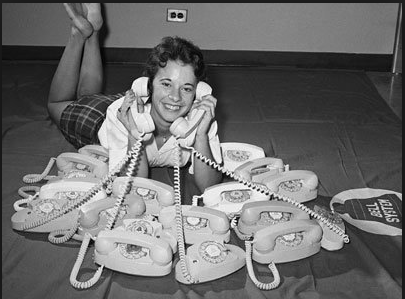Telephone Debates 1900 – Social Media Debates 2000: Are they the same?

Last week, my company had another update and debate about engaging in social media. We talked about engaging social media two years ago and decided we would ignore face book and yelp comments. We reasoned we did not know that much about social media and if we did begin to respond to comments, we would need to hire new people to monitor and respond. Another reason to ignore social media was that if we responded incorrectly we could get sued.
Fast forward two years and now we need to engage the social media for economic reasons. We discovered that when potential customers are searching the internet for our product, now Google customer reviews come with the search! We can no longer ignore social media as customer comments – the good, the bad and the ugly are being discussed in full day light. We must respond to the comments and learn to engage with the discussion that has been going on for years. A head in the sand approach no longer works!
This debate is somewhat similar to what occurred with the introduction of the telephone some one hundred years ago. Gitelman and Pingree in their book New Media 1740-1915 discuss the controversy the introduction of the telephone caused in their chapter entitled “Sinful Network or Divine Service: Competing Meaning of the Telephone in Amish Country.” The telephone was introduced to Lancaster County, Pennsylvania (Amish territory) from 1898 to 1912.
Advertisers promoted the benefits of using the telephone. One advertising company provided nine reasons people needed a phone: “So your wife can use it daily, to order her meat and groceries; you can get at once into communication with your home when you are away…If every clock in the house stops, you can get correct time from central.” The list includes getting help in cases of illness, fire, accidents and burglaries. Facilitating social arrangements, getting market reports, increasing one’s circle of desirable acquaintances, increasing a person’s length of life and staying in touch with friends and relatives are all mentioned as benefits of owning a phone (Gitelman and Pengree 2004).
On the other hand, the Amish and Mennonite churches had debates as to benefits and destructive traits of the telephone. One anti-telephone tract called it a “sinful network.” The real foundational issue was their religious belief of nonconformity and separation from the world. Yes, they discussed surface issues that it led to association with outsiders, to personal pride and it was a temptation for women to gossip. Many of the denominations banned it from member’s homes which caused many splits and people leaving their church because of intolerance of this new technology. Some churches compromised and allowed phones in personal businesses but not in the home, due to economic disadvantage.
What can we learn from these debates? I believe new technology is neutral and it is what we choose independently on how we use it, as to whether it will have positive or negative results in our lives. Guidelines for such debates are:
- Define the new technology and list the benefits and negatives for your business and/or your personal life.
- Observe and list the surface issues.
- Dig deeper and discover the foundation issues and principles that are affected.
- List the pros and the cons of using the new technology.
- Make a decision and stick to it. You may lose members or employees because of the decision.
- Be open to change if circumstances or new information causes you to re-look at the decision.
Where is your company at with how to deal with social media? What is your story?
Lisa Gitelman and Geoffrey B. Pingree, New media, 1740-1915, Media in transition. (Cambridge, Mass.: MIT Press, 2003)
Leave a Reply
You must be logged in to post a comment.